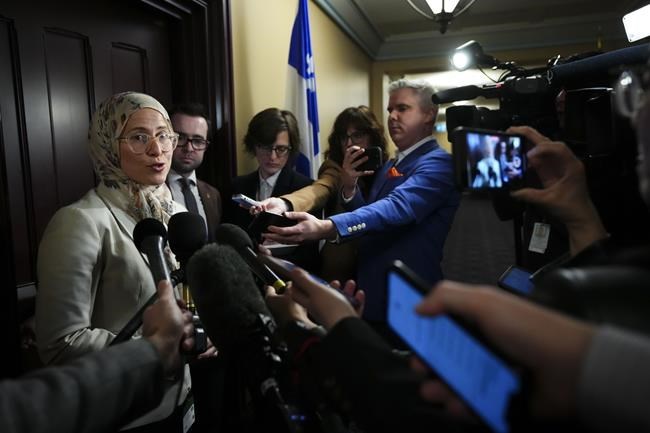MONTREAL — The federal government's appointment of Amira Elghawaby as its first special representative on combating Islamophobia has caused an uproar in Quebec and raised eyebrows elsewhere in the country.
But the former head of the Canadian Jewish Congress, who co-wrote an opinion piece with Elghawaby that led to much of the criticism, said she remains a perfect fit for the job.
On Thursday, the Bloc Québécois added its voice to the calls for Elghawaby to resign, with leader Yves-François Blanchet saying he thinks she is prejudiced against Quebecers and hostile to state secularism. The Coalition Avenir Québec provincial government had called for her resignation earlier.
At the centre of the controversy is a 2019 opinion piece Elghawaby co-wrote for the Ottawa Citizen criticizing Quebec's Bill 21 shortly after it became law. The law, adopted in June 2019, bans public sector workers deemed to be in positions of authority, including teachers, police officers and jail guards, from wearing religious symbols such as the hijab, kippa and turban on the job.
Citing a Léger opinion poll showing 88 per cent of Quebecers who held negative views of Islam supported Bill 21, the article said "the majority of Quebecers appear to be swayed not by the rule of law, but by anti-Muslim sentiment."
Bernie Farber, who co-wrote the article, said he is shocked by the response to the piece more than three years after it was published.
"It's harder to believe that this is about what we wrote four years ago than what Amira Elghawaby truly represents: she is a Muslim, racialized woman who has been appointed to an extremely important job where one province alone, Quebec, has enacted legislation that discriminates against her and her fellow faith communities," he said in an interview.
Farber, who chairs the board of the Canadian Anti-Hate Network — a board Elghawaby sat on at the time they co-wrote the article — said he's known her for more than a decade and they've worked together to fight racism, antisemitism and hate-motivated crime.
"She is probably the finest appointment that the prime minister could have made," Farber said in an interview Thursday. "She's wise, she's thoughtful, she's courageous. (That) doesn't mean that she's perfect, none of us are perfect, and we will make mistakes from time to time. But the thing with Amira is that she recognizes when she has made mistakes and does everything she can to make them right."
Elghawaby apologized Wednesday that her choice of words had hurt people in Quebec, but she did not bend from her view that Bill 21 is a discriminatory law.
François Rocher, a political studies professor at the University of Ottawa, said it's not just the 2019 opinion piece that has Quebecers concerned. Some of her other writing has been seen as prejudiced against francophone Quebecers. And, given that her job is to build bridges, he's not sure she'll be able to do it.
"This is not the best way to ensure that this person will be well received by people, and especially by the political elites, who have been constantly singled out, denounced as racist, Islamophobic, xenophobic and, ultimately, closed to diversity and against Canadian multiculturalism," he said in an interview Thursday.
People can oppose Bill 21 on the grounds that it is discriminatory, he said, "but to say, like she did, that Bill 21 is an illustration of Islamophobia and a demonstration of the racism of Quebecers, that is difficult to accept."
Elghawaby has drawn fire outside Quebec for an article that described the British monarchy as "one of the most powerful symbols of racial oppression" and another that referred to Canada Day as "dominant, European, Judeo-Christian storytelling."
Elghawaby, who did not respond to requests for an interview for this article, graduated from Carleton University in 2001 with a bachelor's degree in journalism and law. She then spent 14 years freelancing as a reporter and associate producer at the Canadian Broadcasting Corporation.
She also worked at the National Council of Canadian Muslims and Canadian Labour Congress.
Before her appointment as special representative — a position that comes with a salary of more than $160,000 — she was the director of strategic communications and campaigns at the Canadian Race Relations Foundation and a contributing columnist for The Toronto Star.
At the event announcing her appointment, Elghawaby said she has faced gendered Islamophobia in her own life and hopes that she will represent, and be a role model for, Muslim women and girls.
"Today, Canada chose to appoint a visibly Muslim women who is committed to working with allies and communities across the nation to fight hate in all of its forms," she said. "We belong here and we have been here all along."
This report by The Canadian Press was first published Feb. 2, 2023.
Jacob Serebrin, The Canadian Press



